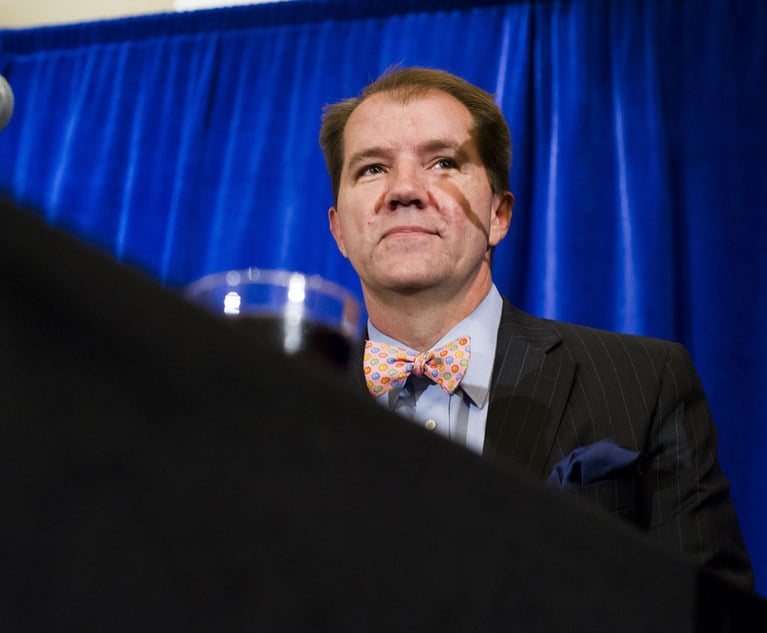 Photo: Pau Barrena/Bloomberg
Photo: Pau Barrena/BloombergKoh's Qualcomm Antitrust Order Could Jeopardize Nuclear Security, DOJ Warns
With backing from Defense and Energy departments, Justice tells the Ninth Circuit that failing to stay Koh's antitrust order could jeopardize national, even nuclear security.
July 17, 2019 at 04:12 PM
5 minute read
The original version of this story was published on The Recorder
The Department of Justice has literally gone nuclear on U.S. District Judge Lucy Koh.
Backed by the Department of Defense, the DOJ warned the U.S. Court of Appeals for the Ninth Circuit on Tuesday that failing to stay Koh's antitrust injunction against the cellular communications giant would pose a national security risk, including to nuclear safety.
DOJ submitted declarations from officials in the Defense and Energy departments spelling out their concerns.
“DoD firmly believes that any measure that inappropriately limits Qualcomm's technological leadership, ability to invest in research and development (R&D), and market competitiveness, even in the short-term, could harm national security,” wrote Ellen Lord, under secretary of defense for acquisition and sustainment,
“DOE's missions in nuclear security and protection of the Nation's energy and nuclear infrastructure are dependent on secure and advanced wireless communications, of which Qualcomm is the major and predominant U.S. supplier of both current generation and upcoming 5G chipsets,” wrote Max Everett, chief information officer of the Department of Energy. “Measures that significantly undermine Qualcomm's financial and competitive position also have the potential to adversely impact the Department's critical missions.”
Koh issued an injunction in May following a bench trial in FTC v. Qualcomm. It would force Qualcomm to license its standard-essential chip modem patents to its competitors on fair, reasonable and non-discriminatory (FRAND) terms and renegotiate licenses with smartphone makers free from threats to disrupt their chip supply. Qualcomm is asking the Ninth Circuit to stay the injunction pending its appeal, saying it threatens to “fundamentally change the way it has done business for decades.”
Before Koh, the FTC turned the national security argument back around on Qualcomm, arguing that a stay would let it entrench its monopoly power during the 5G rollout. “Qualcomm's argument that anything that diminishes its corporate profits would necessarily threaten national security is absurdly overbroad” and contrary to the Sherman Act, the Federal Trade Commission's Jennifer Milici argued to Koh, who declined to enter a stay.
A similar debate played out before the International Trade Commission last fall, after Administrative Law Judge Thomas Pender found it would be against the national interest to exclude Intel-supplied smartphones from the U.S., even if they infringed a Qualcomm patent. Pender found that the wireless industry was best served by healthy competition between Qualcomm and Intel, but Intel has since exited the 5G market.
Now DoD and DOJ are formally throwing their support behind Qualcomm in the FTC dispute. “5G is globally acknowledged by all major international participants as the battleground of the future,” Lord writes in her declaration. “Allies such as France and Germany are also considering ways to limit Chinese vendor participation in core 5G network deployment, as is Japan.”
Lord says the Defense Department's “main concerns include the possibility of cyber espionage,” but DOJ's antitrust division is taking it a step further in its amicus submission.
“Nuclear security and the protection of the Nation's energy and nuclear infrastructure depend on secure and advanced wireless communications,” DOJ says in its statement of interest.
The brief is signed by Patrick Kuhlmann of the antitrust division. It appears that division chief Makan Delrahim, who worked as a lobbyist for Qualcomm in private practice, will be recused from the appeal.
Ericsson Inc. and former Federal Chief Judge Paul Michel also threw their support behind Qualcomm in amicus submissions Monday. Jonathan Massey of Massey & Gail wrote for Ericsson that an injunction will disrupt settled expectations just as the wireless industry is prepared to roll out the 5G standard.
“Without all the necessary elements of the 5G ecosystem available, the enormous amount of money, effort, and technological innovation that has been devoted to this effort over the last several years will be jeopardized,” Massey writes on Ericsson's behalf.
The Ninth Circuit just last year stayed an injunction that requires the operators of Salt Lake Comic Con to change its name and website registrations while they appeal a trademark judgment obtained by the San Diego Comic Convention, Massey points out. So too did the Ninth Circuit temporarily stay the 2011 district court injunction ending the military's “don't ask, don't tell policy” banning openly gay service members pending appeal. “By the same token, the district court's order in this case carries national security implications,” Massey writes.
Matthew Dowd of Dowd Scheffel submitted a proposed amicus from Michel that calls Koh's injunction “extraordinary in its breadth and in its unprecedented interpretation of antitrust obligations in the FRAND and SEP setting.”
Before Koh, LG Electronics was among the amici curiae siding with the FTC. “Without the benefit of this court's injunction,” LG will have to negotiate with Qualcomm from a position of “extreme weakness,” the company argued.
This content has been archived. It is available through our partners, LexisNexis® and Bloomberg Law.
To view this content, please continue to their sites.
Not a Lexis Subscriber?
Subscribe Now
Not a Bloomberg Law Subscriber?
Subscribe Now
NOT FOR REPRINT
© 2024 ALM Global, LLC, All Rights Reserved. Request academic re-use from www.copyright.com. All other uses, submit a request to [email protected]. For more information visit Asset & Logo Licensing.
You Might Like
View All
So You Want to Be a Tech Lawyer? Consider Product Counseling

New Class Action Points to Fears Over Privacy, Abortions and Fertility

5th Circuit Rules Open-Source Code Is Not Property in Tornado Cash Appeal
5 minute read
How Qualcomm’s General Counsel Is Championing Diversity in Innovation
6 minute readTrending Stories
- 1Judicial Ethics Opinion 24-68
- 2Friday Newspaper
- 3Judge Denies Sean Combs Third Bail Bid, Citing Community Safety
- 4Republican FTC Commissioner: 'The Time for Rulemaking by the Biden-Harris FTC Is Over'
- 5NY Appellate Panel Cites Student's Disciplinary History While Sending Negligence Claim Against School District to Trial
Who Got The Work
Michael G. Bongiorno, Andrew Scott Dulberg and Elizabeth E. Driscoll from Wilmer Cutler Pickering Hale and Dorr have stepped in to represent Symbotic Inc., an A.I.-enabled technology platform that focuses on increasing supply chain efficiency, and other defendants in a pending shareholder derivative lawsuit. The case, filed Oct. 2 in Massachusetts District Court by the Brown Law Firm on behalf of Stephen Austen, accuses certain officers and directors of misleading investors in regard to Symbotic's potential for margin growth by failing to disclose that the company was not equipped to timely deploy its systems or manage expenses through project delays. The case, assigned to U.S. District Judge Nathaniel M. Gorton, is 1:24-cv-12522, Austen v. Cohen et al.
Who Got The Work
Edmund Polubinski and Marie Killmond of Davis Polk & Wardwell have entered appearances for data platform software development company MongoDB and other defendants in a pending shareholder derivative lawsuit. The action, filed Oct. 7 in New York Southern District Court by the Brown Law Firm, accuses the company's directors and/or officers of falsely expressing confidence in the company’s restructuring of its sales incentive plan and downplaying the severity of decreases in its upfront commitments. The case is 1:24-cv-07594, Roy v. Ittycheria et al.
Who Got The Work
Amy O. Bruchs and Kurt F. Ellison of Michael Best & Friedrich have entered appearances for Epic Systems Corp. in a pending employment discrimination lawsuit. The suit was filed Sept. 7 in Wisconsin Western District Court by Levine Eisberner LLC and Siri & Glimstad on behalf of a project manager who claims that he was wrongfully terminated after applying for a religious exemption to the defendant's COVID-19 vaccine mandate. The case, assigned to U.S. Magistrate Judge Anita Marie Boor, is 3:24-cv-00630, Secker, Nathan v. Epic Systems Corporation.
Who Got The Work
David X. Sullivan, Thomas J. Finn and Gregory A. Hall from McCarter & English have entered appearances for Sunrun Installation Services in a pending civil rights lawsuit. The complaint was filed Sept. 4 in Connecticut District Court by attorney Robert M. Berke on behalf of former employee George Edward Steins, who was arrested and charged with employing an unregistered home improvement salesperson. The complaint alleges that had Sunrun informed the Connecticut Department of Consumer Protection that the plaintiff's employment had ended in 2017 and that he no longer held Sunrun's home improvement contractor license, he would not have been hit with charges, which were dismissed in May 2024. The case, assigned to U.S. District Judge Jeffrey A. Meyer, is 3:24-cv-01423, Steins v. Sunrun, Inc. et al.
Who Got The Work
Greenberg Traurig shareholder Joshua L. Raskin has entered an appearance for boohoo.com UK Ltd. in a pending patent infringement lawsuit. The suit, filed Sept. 3 in Texas Eastern District Court by Rozier Hardt McDonough on behalf of Alto Dynamics, asserts five patents related to an online shopping platform. The case, assigned to U.S. District Judge Rodney Gilstrap, is 2:24-cv-00719, Alto Dynamics, LLC v. boohoo.com UK Limited.
Featured Firms
Law Offices of Gary Martin Hays & Associates, P.C.
(470) 294-1674
Law Offices of Mark E. Salomone
(857) 444-6468
Smith & Hassler
(713) 739-1250








